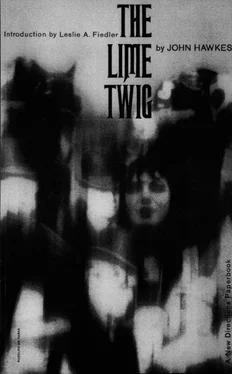We were so close to the old malevolent station that I could hear the shifting of the sandbags piled round it and could hear the locomotives shattering into bits of iron. And one night wouldn’t a cherubim’s hand or arm or curly head come flying down through our roof? Some dislodged ball of saintly brass palm or muscle or jagged neck find its target in Lily Eastchip’s house? But I wasn’t destined to die with a fat brass finger in my belly.
To think that Mr. and Mrs. Banks — Michael and Margaret — were only children then, as small and crouching and black-eyed as the boy with the French sailor’s hat and the dog. It is a pity I did not know them then: somehow I would have cared for them.
Such things don’t want forgetting. When they anchored a barrage balloon over number twenty-eight — how long it was since we had been evicted from that room — and when the loft in Highland Green had burned Ash Wednesday, and during those days when the water would curl a horse’s lip and somebody’s copy of The Vicar of Wakefield was run over by a fire truck outside my door, why then there was plenty of soot and scum the memory could not let go of.
There was Lily Eastchip with bird feathers round her throat and a dusty rag up the tiny pearl lacing of her sleeve; there was the captain dishonorably mustered from the forces; there was the front of our narrow lodging which the firemen kept hosing down for luck; there was the pink slipper left caught by its heel in the stairway rungs and hanging toe first into the dark of that dry plaster hall. And there were our boxes with broken strings, piled in the hallway and rising toward the slipper, all the cartons I had not the heart to drag to Mother’s room. So I see the pasty corporal — Sparrow was his name — rubbing together the handles of his canes, I see Miss Eastchip serving soup, I see Mother’s dead livid face. And I shall always see the bomber with its bulbous front gunner’s nest flattened over the cistern in the laundry court.
Margaret remembers none of it and Mr. Banks, her husband, is not a talker. But Miss Eastchip’s brother went down in his spotter’s steeple, tin hat packed red with embers and both feet in the enormous boots burning with a gas-blue flame. Lily got word of it the eve he fell and with the duster hanging down her wrist and the tears on her cheek she looked as if someone had touched a candle to her nightdress in the dark of our teatime. She stood behind the captain’s chair whispering, “That’s the end for me, the end for me,” while the bearer of the news merely sat for a moment, teacup rattling in the saucer and helmet gripped between his knees.
“Well, sorry to bring distressing information,” the warden had said. “You’d better keep the curtains on good tonight. We’re in for it. I’m afraid.”
A pale snow was coming down when he passed my window — a black square-shouldered man — and I saw the dark shape of him and the gleam off the silvery whistle caught in his teeth. Somebody laid the cold table, and far-off we heard the first dull boom and breath, as if they had blown out a candle as tall as St. George’s spire.
“Good night, Hencher. …”
“Good night, Captain. Mother gave you the salts for Lily, did she?”
“She did. And — Hencher — if anything uncommon occurs in the night, you can always give me a signal on the pipes.”
“I’ll just do that, Captain. It’s good of you.”
Mother got the covers to her chin and, lights off, blackout drawn aside, I sat watching to see the aircraft shoot out the eyes of the cherubim who, beyond sifting snow, and triangulated, now and then, by flooding white shafts of light, hugged each other atop the Dreary Station dome. I held my cheeks. I listened to the old girl’s chamber pot — she had stuffed it with jewelry and glass buttons and an ostrich plume — that rolled about beneath the bed. Missing one front wheel, a tiny tar-painted lorry passed in dreadful crawl and the bare hub of its broken axle screeched and sent off sparks against the stones. And all through that blistering snowy night my hands were drenching the angora white yarn of a tasseled shawl, twisting it like a young girl’s lock of hair.
When engines shook the night beyond the nymphs and apple leaves in the filigreed shutters of my window, I began suddenly to smell it: not the stench of rafters burning, not the vaporized rubber stench that stayed about the street for days after the hit on the garage of Autorank, Limited, but only a faint live smell of worn carpet or paper or tissue being singed within the lodging house itself. And I fancied it was coming round the edges of my door — the odor of smoke — and I held to the arms of my chair and slowly breathed into my lungs that smoke.
“Are you awake?” I said.
She sat up with the nightdress slanting down her flesh.
“You’d better put your wrapper on, old girl.”
She sat there startled by the light of a flare that was plainly going to land in old John’s chimney across the way. I could see her game face and I squeezed on the slippers and squeezed the shawl.
“Don’t you smell the smoke? The house is going up,” I said. “Do you want to bum?”
“It’s only the kettle, William. …” And she was grinning, one foot was trying to escape the sheet. They were running with buckets across the way at John’s.
“You look, William, you tell me what it is. …”
“Out of that bed now, and we’ll just have a look together.”
Then I pulled open the door and there was the hallway dry and dark as ever, the slipper still hooked on the stair, the one faint bulb swinging round and round on its cord. But our boxes were burning. The bottom of the pile was sunk in flame, hot crabbing flame orange and pale blue in the draft from the door and the sleeve of a coat of mine was crumbling and smoking out of a black pasty hole.
Mother began to cough and pull at my hand — the smoke was mostly hers and thick, and there is no smudge as black as that from burning velveteen and stays and packets of cheap face powder — and then she cried, “Oh, William, William.” I saw the pile lean and dislodge a clump of cinders while at the same moment I heard a warden tapping on the outside door with his torch and heard him call through the door: “All right in there?”
I could taste my portion of the smoke; the banging on the door grew louder. Now they were flinging water on old John’s roof, but mother and I were in an empty hall with only our own fire to care about.
“Can’t you leave off tugging on me, can’t you?” But before I could close my robe she was gone, three or four steps straight into the pile to snatch the stays and an old tortoise-shell fan from out of the fire.
“Mum!”
But she pulled, the boxes toppled about her, the flames shot high as the ceiling. While a pink flask of ammonia she had saved for years exploded and hissed with the rest of it.
From under the pall I heard her voice: “Look here, it’s hardly singed at all, see now? Hardly singed …” Outside footfalls, and then the warden: “Charlie, you’d better give us a hand here, Charlie. …”
On hands and knees she was trying to crawl back to me, hot sparks from the fire kept settling on her arms and on the thin silk of her gown. One strap was burned through suddenly, fell away, and then a handful of tissue in the bosom caught and, secured by the edging of charred lace, puffed at its luminous peak as if a small forced fire, stoked inside her flesh, had burst a hole through the tender dry surface of my mother’s breast.
“Give us your shoulder here, Charlie … lend a heave!”
And even while I grunted and went at her with robe outspread, she tried with one hand to pluck away her bosom’s fire. “Mother,” I shouted, “hold on now, Mother,” and knelt and got the robe round her — mother and son in a single robe — and was slapping the embers and lifting her back toward the bed when I saw the warden’s boot in the door and heard the tooting of his whistle. Then only the sound of dumping sand, water falling, and every few minutes the hurried crash of an ax head into our smothered pile.
Читать дальше












